Wings of Hope for Pancreatic Cancer Research
October 2021
A CANCER STORY
by
DENNIS THOMPSON
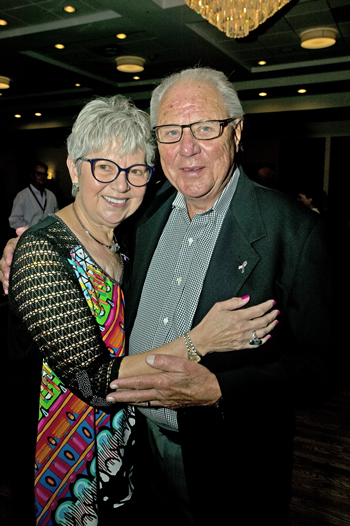
At the 2021 ‘Evening of Hope’ benefit, totally unplanned and unscripted, Jackie Thompson shared her pancreatic cancer journey with the crowd, which responded enthusiastically when she declared her 6 year survival status. As anyone who goes through those dark tunnels in life knows, it is never just one person being diagnosed as much as it is the family members and close friends, all of whom become tireless caregivers in one way or another. Jackie’s husband Dennis, shares here his poignant perspective on being on this journey together with Jackie.
Thank you Jackie and Dennis for giving so many such enormous hope and inspiration.
On Cancer
The word cancer evokes a strong reaction of fear and trepidation whenever we hear it. When that word is uttered about a loved one, we tremble, we cry, and frequently become unhinged from reality. That was my reaction when Jackie was diagnosed with Stage 2 Pancreatic Cancer on August 3, 2015. Now I had a real job…
We had just returned from a magical trip from Venice to Rome on a five masted clipper ship with the Pirates. This was my retirement cruise. Since I had such a struggle with retirement, this cruise shook off the depression and reacquainted me with reality.
On most summer days, Jackie and I enjoy our coffee and newspaper on the deck. On this morning when Jackie walked out, she looked different. She came close and I could see a pale-yellow pallor on her face and stark yellow eyes. She had seen the doctor earlier in the week because she was itching all over her body. He had prescribed a steroid cream, but the itching persisted. Now with the jaundice, it was time to head to the emergency room. They did some tests, took a CT scan and we departed. Before we could get home, Jackie’s phone rang and she was ordered to return to the hospital with an overnight bag. More tests—more waiting. Finally, late in the afternoon, the doctor and a team of doctors-to-be from Mountain Vista Medical School entered her room. Without much preamble, he proceeded to announce to Jackie that she had Stage 2A Pancreatic Cancer. Stunned. We sat in stunned silence as he outlined the procedures that would follow. When they left, the inevitable tears of disbelief fell like a waterfall from our eyes. I finally left to return home with a heavy heart.
The drive home was treacherous due to the flood of tears crowding my vision. Once home, the reality of Jackie’s diagnosis struck like a plunger to my brain. It exploded in rage and anger and then of course, why Jackie? I calmed enough to put my training in clinical research to work. I dove into PubMed, WebMD, Google Scholar and the Mayo internet sites. The research was frightening. But by morning I had a general idea of the road ahead and some of the obstacles we would encounter. Armed with fresh information, I returned to the hospital in time for morning rounds. A new face greeted us, an oncology physician, Dr. Michele Basche and the now familiar troop of doctor wanabees. Dr. Basche was warm and gentle; exuding confidence administered from her compassionate heart. Jackie’s disposition did a 180. Now there was a glimmer of hope in our depressed hearts. She explained the likelihood of a Whipple surgery followed by either chemotherapy and radiation or both. Maybe we thought, Jackie is going to be ok.
The radiation department at Sky Ridge hospital was reviewing Jackie’s CT scan when Dr. Eric Kortz popped in to view another patient’s records. He glanced at Jackie’s report and was immediately drawn to her case, since the symptoms and the CT were decidedly unusual. Since we had not been assigned a surgeon, he wanted the case. Shortly after, he was at Jackie’s bedside explaining how and where the Whipple Procedure would be done. Jackie’s spirits jumped another notch.
By now we realized that the pathetically low survival rate would not detour us from our belief that she needed only one (1) miracle. Her niece, Kristen, coined the phrase: “Believe in the power of one” or the anacronym, BITPOO. From that moment one, we would repeat the phrase at every juncture of this journey and raise one finger to support our belief. The surgery was conducted at Swedish Hospital where Dr. Kortz and his team did between 60 and 70 Whipples per year; the most in the Rocky Mountain region. Prepped and ready, Jackie was on the gurney in the surgery suite hallway when the jaunty little man with the face like Santa Claus with his man bag over his shoulder strode up to greet her. By now Jackie had a school girls’ crush on the adorable surgeon. He asked if she was ready and did she have any questions; to which she replied, “NO, so good luck Dr. Kortz”. He replied, “I don’t need luck, I am GOOD and I’ve got this!”. Gotta’ love him!!
Following six weeks of very eventful healing, Jackie was invited to participate in a Phase 3 clinical trial. This was a blinded trial involving 800 patients from around the US and Europe. The comparison was between the US protocol which called for one chemotherapeutic, Gemcitabine and radiation vs. the European version which included two chemotherapeutics, Gemcitabine and Abraxane and no radiation. In a randomization, she got the European protocol, which I loved since it had shown over 56% improvement vs. US protocol in Phase 2 trials. BITPOO strikes again.
The chemotherapy was challenging. Beginning on October 10, 2015 she was infused every week for three weeks, then a week of rest. This extended for six months during which time she would become increasingly weak, sick and tired till the break at the end of the month. During the second month her hair began falling out in clumps. Put this in perspective. You feel like crap and now your vanity hits bottom. But she rallied (as she always does) by going to the wig shop with her best friends, Muffie and Vienna, and dawning a whole new look. Her hair stylist, Donna, recommended against shaving her head, instead left a stubble to grow back without the associated itching.
As I look back on this harrowing time, I am struck with the significance of just how strong Jackie was during the darkest days. She clung to her faith and to our mantra: BITPOO. I also recall that at every turn the response of the medical team or Jackie’s support group, exceeded our expectations. That includes our neighbor, Pat Turek, engaging her cousin Mary, a nun in Connecticut to have 100 nuns pray for her every day. It includes the good fortune of Dr. Kortz, being at Sky Ridge on a rare visit and seeing the need to do her surgery. It includes the good fortune of being in the European protocol of the clinical trial. And finally, it is the support of all of our friends, family, and neighbors who rained love upon her. We can now say with some certainty, that she has defeated the beast which is cancer.
Now like our Pirate pals, she can say: “ARRR“, Rest, Recuperate & Repair. “We will growl at adversity and conquer the unknown”—ARRR…
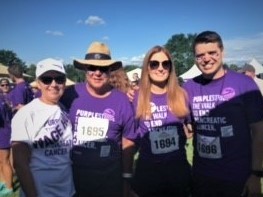
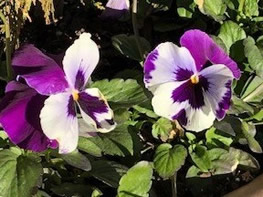
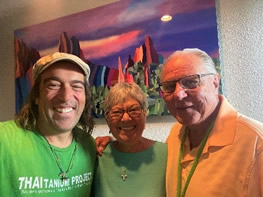
March 2019
ROB FRANCOEUR
(CMSgt(ret) USAF)
A Blessed Survivor’s Story
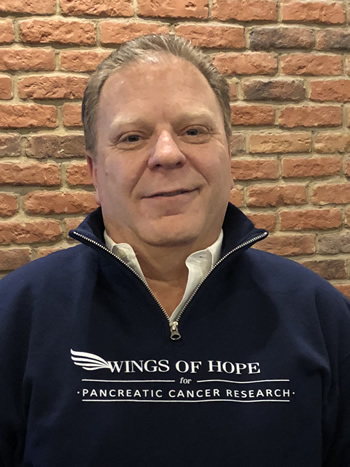
I have been asked to share my story of being a very fortunate survivor of pancreatic cancer. At the time I am writing this I am one year out from my last treatment and have had all “clean” check-ups!
My story starts back in 2006 when I was active duty Air Force stationed in Omaha, NE. I had gone in for my annual physical and when the doctor pressed on my abdomen, I came up off the exam table in pain. He ran some blood tests which showed elevated pancreatic enzymes. He retested me a week later and the enzymes were down, but I still had the pain. I was referred to a gastroenterologist who diagnosed me as having irritable bowel syndrome (IBS) which I was treated for going forward. I still had the abdominal pain if pressure was put on my abdomen. I have an extended history of back issues, so the typical back pain associated with pancreatic cancer was not an indication in my case.
In February 2015, while driving home from work I started having chest and abdominal pains. I started wondering if I was having a heart attack, but I didn’t have any of the other warning signs. I quickly saw my primary care provider who ruled out a heart attack and gave me referrals to see a gastroenterologist and a cardiologist. After several cardiac tests any possible issue with my heart were ruled out.
Still having the abdominal pain my gastroenterologist ran what seemed to be every possible test under the sun with no insight to what was causing my pain. From time to time my blood work would show elevated pancreatic enzymes. Unfortunately, when they were rechecked, they would be normal again. One day my gastroenterologist said that the next time I had an episode of pain to go get a blood test done and if my pancreatic enzymes were elevated, she would refer me to University of Colorado Health (UCHealth) Anschutz Medical Campus to see a doctor who did Upper GIs (EGDs) with ultrasound to look at my pancreas. I asked her why we were waiting when I have been dealing with this for two and a half years and we have no idea what is causing my pain? She agreed to refer me to see Dr. Raj Shah at UCHealth at that point.
When I saw Dr. Shah, he intently looked at my last negative MRI and said “I don’t necessarily agree it is a negative MRI. I don’t see a mass, but something doesn’t look right.” He went on to say he wanted to do the EGD with ultrasound to get a better look, so we scheduled it for April 14, 2017 (Good Friday).
It was not a “Good Friday” in the least. When I woke up in recovery after the procedure Dr. Shah came in and pulled up a chair next to the bed (never a good sign when they do that) and said “I never expected to find what I did during your procedure. I found a mass on your pancreas and I am referring you to surgery.” To say I was in shock is an understatement. I didn’t say a single word to my friend who had brought me to the appointment until we got out to his truck in the parking garage. I said, “I have pancreatic cancer!” Needless to say, the ride home was pretty quiet. Since I am single and live alone, he was not sure if he should leave me by myself. I reassured him I would be fine and if I wasn’t, I would call for help.
Now I had to tell my family in Connecticut, Georgia, and here in Colorado what I just found out. Not an easy thing to do over the phone. Luckily everyone was supportive and positive in supporting me in my journey to fight my cancer aggressively.
The following week I was contacted by the UCHealth Pancreas and Biliary Multidisciplinary Clinic and set up with an all-day appointment that week which included blood tests, a CT scan, counseling, and finally a meeting with Dr. Richard Schulick (Director of the University of Colorado Cancer Center and my surgeon). The UCHealth Pancreas and Biliary Multidisciplinary Clinic uses a team approach to treating each patient. A team of doctors and specialists meet to review the patients test results and develop an individualized plan of treatment. Dr. Schulick explained the results of all my tests and the team’s recommendation. The recommendation was to perform a Distal Pancreatectomy which was quickly scheduled for May 1, 2017, as I did not want to delay and allow the mass to grow.
Surgery went well and I could not have asked for a better surgical team than Dr. Schulick and his team. I was released from the hospital ten days after surgery and continued to maintain a positive state of mind. I met with Dr. Regina Brown at the UCHealth Cancer Care Clinic - Lone Tree in early June 2017 to discuss my upcoming chemotherapy treatment. Dr. Brown and I hit it off from the start as we were both prior Air Force. She explained my chemo treatment would entail infusions once a week for three weeks and one week off for six months (18 treatments total). My chemo treatments started in July and ran until December 2017.
I truly believe the awesome medical staff at UCHealth Cancer Care Clinic - Lone Tree, led by RN Jill, helped me get through my chemo treatments stress free. From the MAs to the RNs they are all “True Professionals” working in a tough field making things more tolerable for those of us who have to be treated.
During my initial visit with Dr. Brown, she told me about a doctor, Dr. Karen Goodman, at UCHealth Anschutz Cancer Pavilion that was doing a clinical trial in the benefits of combining radiation therapy with chemotherapy for the treatment of pancreatic cancer and asked if I would be willing to talk with her. I said sure as I felt the treatment I was about to receive for my cancer was based on people in the past participating in clinical trials and if I could possibly help myself and others in the future, I was willing to try it.
I met with Dr. Goodman, but I was not a candidate for the clinical trial as it was focused on another part of the pancreas from where my cancer was located. Even though I wasn’t a candidate for Dr. Goodman’s clinical trial, she told me there had been other studies done showing positive results of combining radiation therapy with chemotherapy, so I elected to do radiation therapy in addition to my chemotherapy.
My radiation therapy was done at the UCHealth TomoTherapy Cancer Care Clinic - Lone Tree and entailed daily treatments five days a week for five and a half weeks (28 treatments). Valentine’s Day will always have a new meaning to me as that was the day of my last radiation treatment. The staff at the center was awesome and made my experience less stressful.
My Takeaways and Suggestions for Others:
- First and foremost, keep a positive attitude and surround yourself with positive people who will support you in your fight to beat the cancer.
- You can reconnect with those that are not supportive of your way of fighting the cancer when you are done.
- We did not ask to have cancer, but we cannot back up to the “Y” in the road called life and go the other direction this time to change things!
- In other words, do not stress over something you cannot change. Accept what life has handed you and charge forward giving it all you can and fight it.
- If you have the misfortune of being diagnosed with pancreatic cancer, there is no better place in Colorado to be treated than UCHealth Pancreas and Biliary Multidisciplinary Clinic and associated Cancer Care Clinics (especially UCHealth Cancer Care Clinic - Lone Tree led by Dr. Brown and RN Jill).
- You are your best advocate and know your body best. If something does not seem right, have it checked out and do not give up until they figure out what is wrong.
- Last, but by far not the least, no matter your faith belief, have faith that you will make it through this!
BILL ZIEGLER
A Survivor’s Story
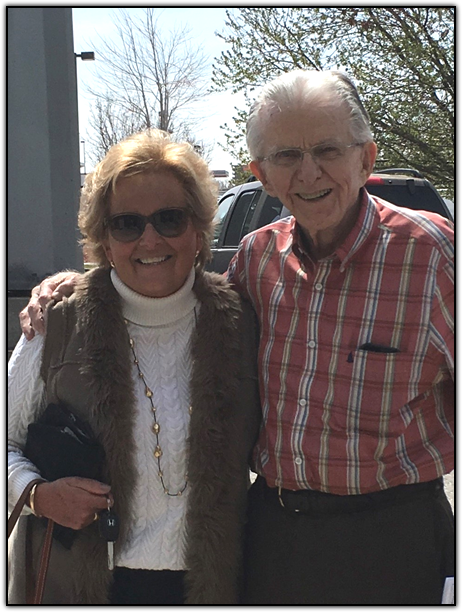
WINGS OF HOPE founder Maureen Shul and Bill Ziegler, pancreatic cancer survivor
I have been asked to tell the story of my experience with pancreatic cancer, 17 years ago, and I am very glad to be here to tell it. I think that I became a survivor because of an incidental blood test which revealed significantly elevated liver enzymes. I was asymptomatic, and the doctor was alarmed by the lab findings. I was seen by a gastroenterologist, Tomas Reed, who did an endoscopy procedure. He said, “You are 75 years old, jaundiced, and you have pancreatic cancer, which is not operable.” He told me to go home, and expect to live for three or four weeks. I had retired a year earlier, my wife had passed on six months earlier, and I had two dogs and a cat. I went home and waited to start to feel bad. I have no memory of the next four days, after which Dr. Reed called to tell me that he had sent my images to John Cameron, at Johns Hopkins, who felt that my cancer was operable, and to call Johns Hopkins for an appointment. I remember having always declared that were I to receive a bad diagnosis, I would “go with the flow”, and do little or nothing. A daughter, Retta, has told me that when it did happen, I became determined to do whatever I could.
I have met a notable lady, Maureen Shul, who, after her mother and brother succumbed to pancreatic cancer, formed a foundation, “Wings of Hope”, in support of pancreatic cancer research. That name reminds me of Emily Dickenson’s wonderful poem, “Hope”, which I found helpful during my cancer ordeal, and since.
John Cameron, then Chief of Surgery at Hopkins, was the world-wide guru of pancreatic cancer surgery, and I felt fortunate to be his patient. During the three weeks of waiting to go to Baltimore, I became quite ill. The most severe symptom was unrelenting, and unrelieved itching of jaundice, with uncontrollable scratching of every square inch of skin. In addition, I became weak and unsteady and required assistance in walking. Retta accompanied me to Baltimore, making it possible for me to get there.
The surgery was scheduled for nine am the morning after I arrived at nine pm. I was afraid that it might be cancelled. I went immediately to ICU where amazing nurses performed a bowel prep, and waited for word from Dr. Cameron, who was arriving from out of town. At two am I was relieved to learn that Dr. Cameron had said that the surgery would proceed. My Retta was told that the surgery, itself, unrelated to the underlying lesion, carried a mortality risk of 50%. She did not tell me that until much later. I had thought that the risk would be the same as for any surgery.
Dr. Cameron’s routine was, with the help of a resident, student and nurses, to open the abdominal cavity and explore the other organs, while four other surgeons, scrubbed, gloved and uniformed, waited along a wall of the room. When they learned that the surgery was to proceed, they surrounded the table and assisted. I don’t know how long the surgery took but I imagine it was a good while. Later, I looked in a surgical textbook to study the procedure known as The Whipple, named for a surgeon, and found that it is so complex that I could understand none of it. I later learned that John Cameron’s policy was that, if the lesion exceeded a diameter of three centimeters, he considered it inoperable, and did not do The Whipple. My lesion measured three and a half centimeters, and he did it anyway. I don’t know why.
After the surgery, for a number of days, a blood sugar level was obtained every four hours to see if I had lost enough Islets of Langerhans to have become diabetic. I had not; more good luck. I was there for three more weeks, enjoying wonderful care. Every single morning, Dr. Cameron would appear in my room at six am, in a tie, a white shirt, and his white jacket, followed in ten minutes by his extensive house staff. On one of those mornings, the very gentle Dr. Cameron said, “I think you should try not to belch so much. It could lead to retching, and we don’t want that.” Wondering how it was possible to control belching, I tried, and apparently succeeded. After about ten days post-op, on the third day of my asking Dr. Cameron if I could have ice chips, he said I could. I was ecstatic. I told the nurses’ aide that Dr. Cameron had said I could have ice chips, and she brought me some right away. I thought that I was in a most “wonderful world.”
A few minutes later, another nurse came in, saw the ice chips, and said, “What are you doing”? I told her that Dr. Cameron said I could have ice chips, and she said, “Well, he has not ordered them”, and took them away. I said, “Could you call Dr. Cameron and get the order?” She said, “I wouldn’t think of calling Dr. Cameron about ice chips.” I was angry, got out of bed, took my IV pole with me, went out by the nurses’ station, bent over, and drank water from a fountain. A nurse saw me, of course, and I was soon back in my room getting a severe tongue-lashing from a resident who had run to my room from downstairs. He told me that I could have destroyed the result of the entire procedure.
One evening, Retta, leaving the hospital about midnight, walking through the darkened, otherwise deserted lobby, came upon a young lady playing a piano. The young lady was the medical student who had been in the operating room throughout my operation. She told Retta that, during the surgery, Dr. Cameron said to his colleagues, “Fellas, I think this one is going to work”. One day, a young physician came by. After Retta commented to him how wonderful she thought it was that all of the cancer had been removed, and no regional node was involved, he said, a trifle smugly, and a bit sardonically, “Well, he does have pancreatic cancer, and can expect to have about two years to live.” I hope that that young man has since learned more about physician/patient communication.
I came home after three weeks, and followed up with my oncologist, Richard Hesky. The protocol was to wait until two months after the surgery to start the chemotherapy and radiation. They were started at the same time; five weeks of radiation, five days per week, and six months of chemo. I had no side effects from either one. After two years, Dr. Hesky told me that my markers had returned to normal, and that since I was asymptomatic, in pancreatic cancer, unlike some other cancers, it meant that I was cured. I have had no further trouble that could be related to my pancreas. I do ingest 21 capsules daily, of pancreatic enzymes, to facilitate the digestion of starches, fats, and protein.
I am delighted to be able to share this story, and hope that it might be found helpful to some.
JIM AND JANET COMERFORD
Grand Junction, Colorado
We received an unexpected introduction to the dire circumstances of pancreatic cancer with Jim’s diagnosis, surgery and treatment in 2010. We are very blessed that Jim is a survivor and is doing well 2 ½ years later. His surgery (Whipple Procedure) at St. Mary’s Medical Center in Grand Junction coupled with chemo-radiation treatment and periodic exams at the CU Cancer Center in Denver have shown us that there is hope in the remarkable, “world class” quality of care that is available right here in Colorado. The goals of Wings of Hope for Pancreatic Cancer Research align perfectly with our personal mission – to raise statewide awareness of pancreatic cancer, especially the importance of early detection and the available treatment options, and to raise funds for the research and treatment programs at the University of Colorado Cancer Center, which is truly on the leading edge in the battle against pancreatic cancer. We are pleased to support Wings of Hope for Pancreatic Cancer Research.
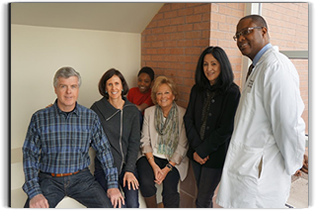
Jim Comerford, Janet Comerford, Isaiah Weekes, Maureen Shul, Paula Sandoval and Dr. Colin Weekes at the University of Colorado Cancer Center
February 13, 2014
Dear Maureen,
I feel very lucky and blessed to have Dr. Colin Weekes as my doctor and Dr. Barish Edil, the surgeon who performed the pancreaticoduodenectomy (whipple) on me in December 2012. I am in the 10% bracket that make it through a year after diagnosis and hope to be in the 6% of the blessed ones who live longer than 5 years, and with the grace of God, I will.
I read about your losses and I want to express my condolences. Only those of us who have walked along those dreadful paths know the darkness that can be encountered when time is not our ally or when other circumstances don't come together in our favor.
Thank God for the CU Cancer Center doctors, staff and wonderful people like you who stand for those affected by cancer.
ARTURO GARCIA
Lakewood, Colorado
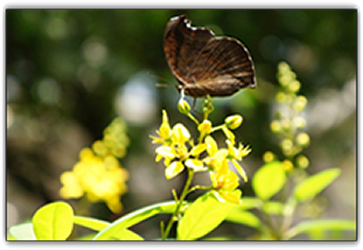
From The Pueblo Chieftain
Published: November 24, 2013;
Battling pancreatic cancer
I was pleased to learn more about the University of Colorado Cancer Center and University of Colorado Hospital and their work in pancreatic cancer. In fact, it may be leading the national effort in its multi-disciplinary clinic serving more than 200 pancreatic cancer patients and performing more than 100 surgeries since last year.
The many specialties in major health issues at the CU Anschutz Medical Campus don’t always garner publicity across the state, even though many patients from all corners are served by CU physicians.
I was impressed to learn that the CU Center participated in a clinical trial in which a combination therapy was used, the first in 15 years, that showed clinically significant benefits for advanced stage pancreatic cancer.
As this month is National Pancreatic Cancer Awareness month, I hope media sources alert the public about the stellar work going on at CU in health matters that touch so many lives from Alzheimer’s disease to cancer. Word has reached me that the multi-disciplinary approach to treatment has brought patients to Colorado from as far away as Europe.
As universities struggle for funding these days, this is surely an effort worthy of supporting.
Alvin Rivera
Pueblo, Colorado

JOIN THE EFFORT…BE A PART OF THE POSSIBLE, BE THE HOPE.


